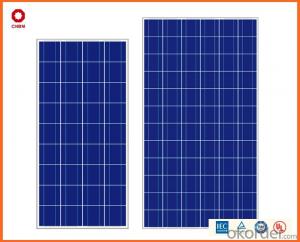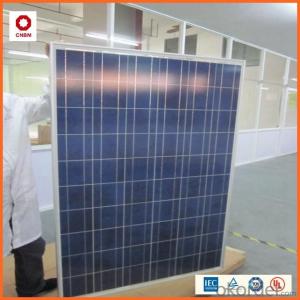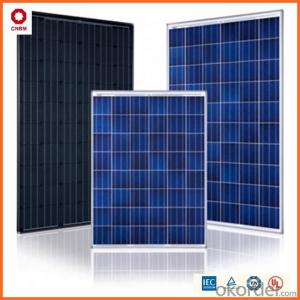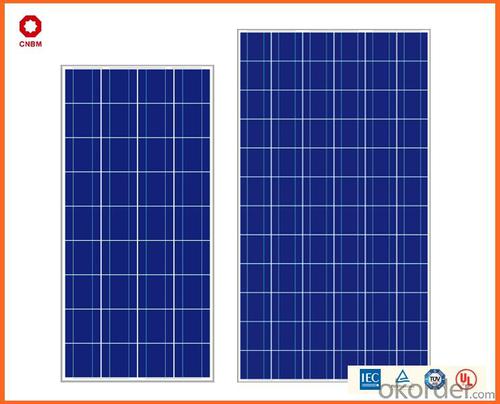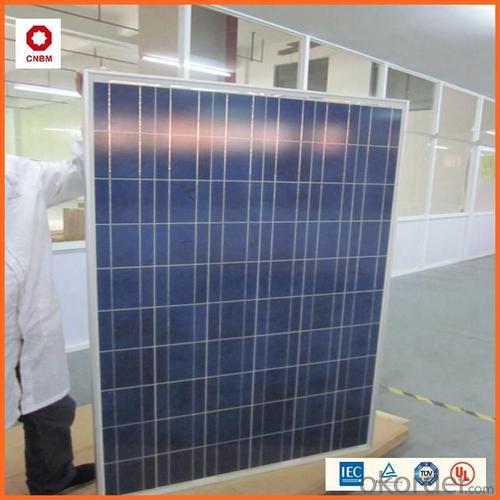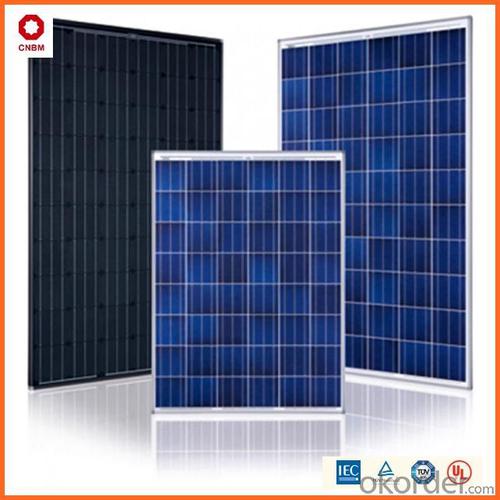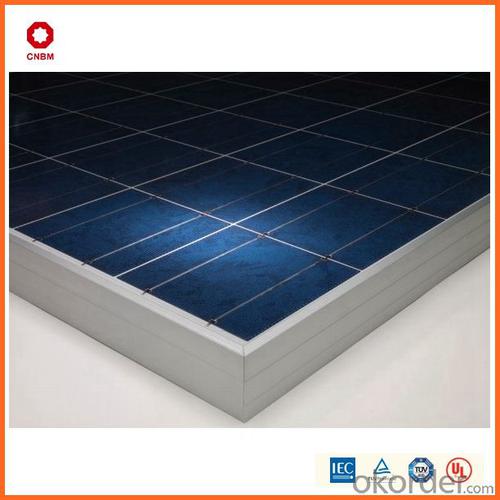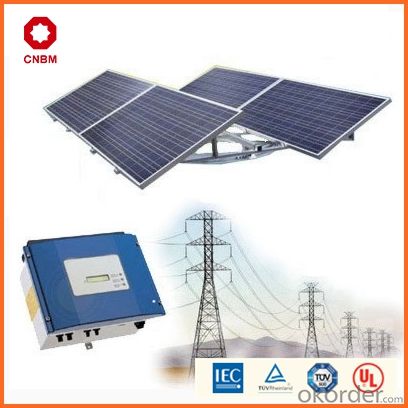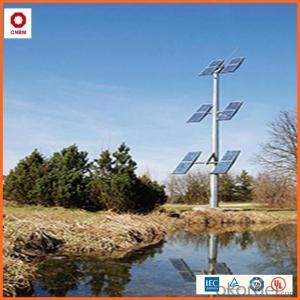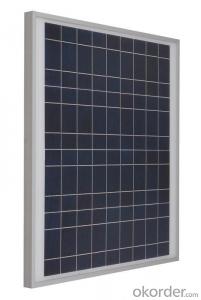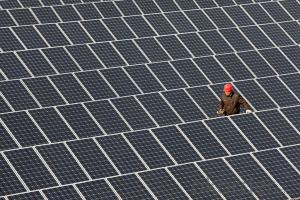John Maui Solar Energy Systems 50w Poly Small Solar Panels with Good Quality
- Loading Port:
- China main port
- Payment Terms:
- TT OR LC
- Min Order Qty:
- 1 watt
- Supply Capability:
- 10000000 watt/month
OKorder Service Pledge
OKorder Financial Service
You Might Also Like
Specification
Hot Sale !!! Quality and Safety of Small Poly Solar Panel 25~85w
1. Rigorous quality control meets the highest international standards.
2. High-transmissivity low-iron tempered glass, strong aluminium frame.
3. Using UV-resistant silicon.
4. IS09001/14001/CE/TUV/UL
Warranties of Small Poly Solar Panel 25~85w
1. 10 years limited product warranty
2. 15 years at 90% of the minimal rated power output
3. 25 years at 80% of the minimal rated power output
Specification
Characteristics of Poly solar panels CNBM (25-85W) | |||||
Max Power Voltage Vmp(V) | 30.3 | 30.8 | 31.1 | 31.4 | 31.85 |
Max Power Current Imp(A) | 7.60 | 7.64 | 7.73 | 7.81 | 7.85 |
Open Circuit Voltage Voc(V) | 36.1 | 36.6 | 37 | 37.3 | 37.68 |
Short Circuit Current Isc(A) | 8.50 | 8.55 | 8.65 | 8.75 | 8.85 |
Max Power Pm(W) | 230W | 235W | 240W | 245W | 250W |
Temperature Coefficient of Cells Poly solar panels CNBM (25-85W) | |
NOCT | 45± 2 |
Temperature Coeffucients of Isc | 0.0492 |
Temperature Coeffucients of Voc | -0.3374 |
Temperature Coeffucients of Voc | -0.4677 |
Mechanical Data of Poly solar panels CNBM (25-85W) | |
Dimension | 1638 × 982 × 40 mm |
Weight | 19.5 kg |
No. of Cells and Connections | 60 (6 ×10) |
Tolerance | 0 ~ + 5 W |
Cell | Monocrystalline Cell 156 × 156 mm |
Packing | 624 Pcs/40ft(H) Container |
Limits of Poly solar panels CNBM (25-85W) | |
Operating Temperature | -40 to +85 |
Storage Temperature | -40 to +85 |
Max System Voltage | 1000VDC(IEC) / 600VDC(UL) |
Features of our products:
• High conversion efficiency mono/poly-crystalline amorphous silicon solar cells
• Modules incorporate high performance bypass diodes to minimize the power drop caused by shading
• High transmittance, low-iron tempered glass
• High performance EVA encapsulant to prevent destroying and water.
• AI frame: without screw, corner connection. 8 holes on the frame can be installed easily
• Good performance of preventing from atrocious weather such as wind and hails
• Certifications: CE IEC TUV VDE UL, Class I
• 10 years 90% power output warranty

Shipping of Small Poly Solar Panel 25~85w
By Sea | Delivery from Shanghai or Ningbo seaport |
By Air | Departure from Shanghai Pudong Airport |
By Express | Post by DHL, EMS, UPS, TNT. |
Features of our products:
• High conversion efficiency mono/poly-crystalline amorphous silicon solar cells
• Modules incorporate high performance bypass diodes to minimize the power drop caused by shading
• High transmittance, low-iron tempered glass
• High performance EVA encapsulant to prevent destroying and water.
• AI frame: without screw, corner connection. 8 holes on the frame can be installed easily
• Good performance of preventing from atrocious weather such as wind and hails
• Certifications: CE IEC TUV VDE UL, Class I
• 10 years 90% power output warranty
As a professional Solar Panel manufacturer and Supplier in China, we have our customers come around the whole world and our specialization has got a worldwide recognition. Meanwhile, with our superior quality, competitive price, prompt and excellent service, As main role in trade section of CNBM Group, CNBM International Corporation supplies products including Monocrystalline Solar Panel, Polycrystalline Solar Panel ( multicrystalline silicon Solar Panel) have received and enjoyed famous reputation in many countries and regions in the world.
- Q: Are solar energy systems suitable for residential properties?
- Yes, solar energy systems are suitable for residential properties. They can efficiently generate electricity and provide homeowners with a clean and renewable energy source. Additionally, solar panels can be installed on rooftops, maximizing space utilization. With advancements in technology, solar energy systems have become more affordable, making them a viable option for residential properties.
- Q: Can solar energy systems be used in areas with high levels of snowfall?
- Yes, solar energy systems can still be used in areas with high levels of snowfall. While snow can temporarily reduce the energy production of solar panels, they are designed to withstand heavy snow loads. Additionally, the angle and positioning of the panels can be adjusted to help snow slide off more easily. Regular maintenance and cleaning can also ensure optimal performance during snowy periods. Overall, with proper installation and management, solar energy systems can still be effective in areas with high snowfall.
- Q: Can solar energy systems be used for heating and cooling buildings?
- Yes, solar energy systems can be used for heating and cooling buildings. Solar thermal systems can be used to capture and convert sunlight into heat energy, which can be used to heat water or air for heating purposes. Additionally, solar-powered air conditioning systems can utilize photovoltaic panels to generate electricity that powers cooling systems, providing an eco-friendly and sustainable alternative to traditional heating and cooling methods.
- Q: Can solar energy systems be used in areas prone to hurricanes?
- Yes, solar energy systems can be used in areas prone to hurricanes. While hurricanes can cause damage to infrastructure, including solar panels, advancements in technology have allowed for more resilient solar energy systems that can withstand extreme weather conditions. Proper installation and design, such as using hurricane-resistant materials and securing the panels, can help ensure their durability during hurricanes. Additionally, solar energy systems can provide a reliable and sustainable source of power during and after hurricanes, helping communities to recover and rebuild.
- Q: How does the presence of birds or other wildlife affect the performance of solar panels?
- The presence of birds or other wildlife can potentially affect the performance of solar panels in several ways. One of the main concerns is the possibility of bird droppings on the surface of the solar panels. Bird droppings can create a layer of dirt and debris, reducing the amount of sunlight that reaches the solar cells. This can lead to a decrease in the efficiency of the panels and a decline in their overall performance. Another issue is the risk of bird nests or other wildlife habitats being built near or on the solar panel systems. These nests can obstruct the sunlight from reaching the panels, causing a drop in energy production. Additionally, nests can potentially damage the panels or their mounting structures if they are built in close proximity. Furthermore, larger birds like raptors or pigeons may occasionally perch on the solar panels, causing physical damage to the panels or the wiring. This can lead to malfunctions or reduced electrical output. To mitigate these potential issues, there are several solutions available. One common approach is the use of deterrents such as bird spikes, netting, or scare devices to prevent birds from landing or nesting on the panels. Regular cleaning and maintenance of the panels are also important to remove any bird droppings or debris that may accumulate. Additionally, designing solar panel systems with bird-friendly features in mind can help minimize the impact on wildlife. For example, incorporating gaps or spaces between panels can discourage birds from nesting, while still allowing sufficient airflow for cooling. In conclusion, while the presence of birds or other wildlife can pose challenges for solar panels, implementing preventive measures and maintenance practices can help ensure optimal performance and longevity of the system.
- Q: Can solar panels be installed on different surfaces like glass or metal?
- Yes, solar panels can be installed on different surfaces like glass or metal. In fact, solar panels are commonly installed on glass surfaces, such as windows or skylights, to maximize sunlight exposure. Additionally, solar panels can also be mounted on metal roofs or other metal structures. The key requirement is ensuring a sturdy and secure installation to support the weight of the panels and maximize their efficiency.
- Q: Can solar energy systems be installed in any location?
- Solar energy systems can be installed in most locations, but certain factors need to be considered. The amount of sunlight, available space, and structural integrity of the site are important considerations for successful installation. Additionally, local regulations and permits may also influence the feasibility of installing solar energy systems in specific locations.
- Q: Can solar energy systems be used in historical or protected buildings?
- Yes, solar energy systems can be used in historical or protected buildings. In fact, incorporating solar energy systems into such buildings can be a smart and sustainable solution. While the installation of solar panels on historical or protected buildings might require careful planning and consideration, it is certainly possible to preserve the integrity and aesthetics of the architecture while benefiting from renewable energy sources. One approach to installing solar energy systems on historical or protected buildings is by using integrated solar panels. These panels are designed to blend seamlessly with the building's design and are installed in a way that does not alter the historical features. This can be achieved by placing the solar panels on flat roofs, using solar tiles, or installing solar panels on less visible parts of the building, such as the rear or sides. Another consideration when installing solar energy systems on historical or protected buildings is the preservation of the building's structural integrity. This can be done by employing non-penetrating mounting systems that do not require drilling or damaging the building's structure. Additionally, consultation with architects, engineers, and preservation experts is crucial to ensure the installation process adheres to any preservation guidelines or regulations. By embracing solar energy systems, historical or protected buildings can become more sustainable and reduce their carbon footprint. Solar panels can provide a clean and renewable source of electricity, reducing dependence on fossil fuels and decreasing greenhouse gas emissions. Moreover, solar energy systems can often generate enough power to meet the energy needs of these buildings, making them self-sufficient and potentially even providing surplus energy that can be fed back into the grid. In conclusion, solar energy systems can indeed be used in historical or protected buildings with careful planning and consideration. By utilizing integrated solar panels and consulting with preservation experts, it is possible to harness the benefits of renewable energy while preserving the architectural and historical value of these buildings. This approach not only ensures a sustainable future but also showcases the harmonious coexistence of modern technology and historical preservation.
- Q: Can solar energy systems be used in areas with limited access to solar energy research facilities?
- Yes, solar energy systems can still be used in areas with limited access to solar energy research facilities. The research facilities are primarily used for studying and advancing solar energy technologies. However, the basic principles of solar energy and the design and installation of solar systems are well-established. Therefore, even without access to research facilities, solar energy systems can still be implemented effectively in areas with limited solar energy research.
- Q: Can solar energy systems be used in apartment buildings or multi-unit dwellings?
- Yes, solar energy systems can be used in apartment buildings or multi-unit dwellings. With advancements in technology and design, solar panels can be installed on rooftops or shared spaces of apartment buildings to generate clean and sustainable energy. This allows each unit to benefit from renewable energy and potentially reduce electricity costs. Additionally, solar energy systems can be integrated into the building's infrastructure, providing a reliable and efficient source of power for common areas and facilities within the complex.
Send your message to us
John Maui Solar Energy Systems 50w Poly Small Solar Panels with Good Quality
- Loading Port:
- China main port
- Payment Terms:
- TT OR LC
- Min Order Qty:
- 1 watt
- Supply Capability:
- 10000000 watt/month
OKorder Service Pledge
OKorder Financial Service
Similar products
Hot products
Hot Searches
Related keywords
